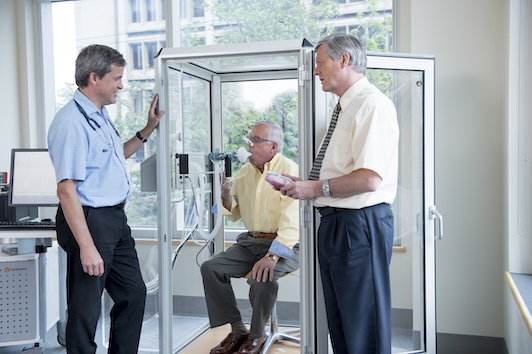Lung problems plagued David Shoots since his youth. It would take buying a dream cottage as an adult for him to finally piece together the puzzle behind his poor health: a rare, but life-threatening, fungal infection known as chronic pulmonary
aspergillosis (CPA).
As a teen, David grew up in a home that frequently flooded, causing mould to flourish. Later, his lungs collapsed at different times. He received surgery, which helped his condition, but no clear answers about the cause.
After marrying and having kids of his own, David bought a cottage in Bruce County as a second home for his Brantford-based family. The cottage had a musty odour but, at the time, no one thought twice about it. That is
until David got really sick.
“One summer, I started having symptoms like a pneumonia. The fever, chest pain, night sweats and coughing wouldn’t go away – even after being hammered with antibiotics and steroids,” David recalls.
Doctors, too, were stumped by David’s symptoms and the CT scans showing shadowing on his lungs. Unable to provide him with a clear cause for his illness, David started to seek out his own answers.
“I don’t even know why but I started looking into mould exposure,” he says. “And the more I looked into it, the more I thought, ‘that could actually be the problem.’ That’s when I contacted Dr. David Denning at the University of Manchester.”
In hearing David’s story, Dr. Denning – a world-renowned expert in fungal diseases – connected with his specialists in Canada over email, validating his concerns. To be certain, David visited St. Joe’s Firestone Institute for Respiratory Health for testing. There, under the care of respirologist Dr. Gerard Cox, David was finally able to get the answers he needed.

Dr. Cox diagnosed David with CPA, a condition caused by a common mould that lives indoors and outdoors. While most people breathe aspergillus spores every day without getting sick, for some, like David, it can lead to a lung infection requiring a powerful antifungal drug to treat.
Because aspergillosis is rare – an estimated 1.8 per cent of Canadians are affected by serious fungal infections – it often goes undiagnosed. Unfortunately, aspergillosis also doesn’t go away.
“The medication doesn’t cure the infection but keeps it at bay,” David says. “And while I’ve been doing better ever since, I still have problems, like bad bronchiectasis where my lungs can’t clear phlegm naturally. But I’m well enough to live a relatively close-to-normal life. And when I have a flareup, Dr. Cox is my doc and I know he’ll take care of me.”
Today, David credits Dr. Cox and his team for not only taking years of debilitating symptoms seriously, but also for saving his life. In many climates outside of Canada where mould runs rampant, chronic aspergillosis is a “hidden disease” that often gets misdiagnosed. Deaths are attributed to tuberculosis instead, David says.
That’s why David shares his story widely – to raise awareness about the realities of fungal infections. And that’s why, over the years since David was diagnosed, his Hyundai dealership in Brantford has donated nearly $30,000 to St. Joe’s to help advance research into lung health. His hope is that, one day, respiratory researchers will find better treatments or a cure for aspergillosis, as well as other diseases of the lung.
“I have to be very cautious because of COVID-19,” David says. “I avoid breathing in any particles of any kind. I can’t go into a dusty barn, and I definitely can’t go outside if there are air quality issues, like smoke from the recent wildfire events.”
“But there’s a lot of people who have it a lot worse, like people living with lung cancer. So, that’s why I donate to St. Joe’s. Because the Hospital was there for me when I was looking for answers. And through more research, doctors like Dr. Cox will be able to provide other patients with the answers they need, too. I’m so thankful that Dr. Cox took the time to figure out my case.”
The Firestone Institute for Respiratory Health
For decades, St. Joe’s Firestone Institute for Respiratory Health, a partnership with McMaster University, has been a world leader in the treatment of lung diseases like asthma, chronic obstructive pulmonary disease (COPD), and pulmonary fibrosis. The goal of the Institute is to conduct research that increases the understanding of respiratory health and disease though collaborative clinical studies that aim to enhance patient care at the Hospital. The Institute’s reputation as a leader in respiratory health is not only evident in the volume of high-quality, peer- reviewed studies it produces, but also by putting into practice new and innovative treatments that enhance the care of the patients St. Joe’s serves.




